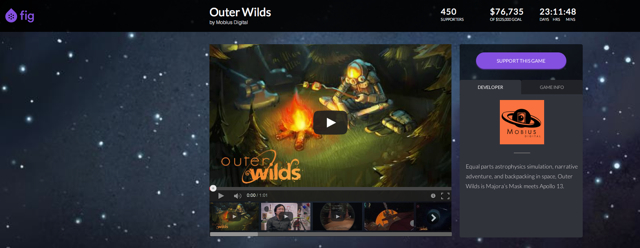Fig: New Game Crowdfunding Site Offers Equity to Investors
August 25, 2015
The new crowdfunding platform Fig just launched with a new way to finance computer games. Its debut is a campaign to raise $125,000 for “Outer Wilds,” an unfinished game already honored with the 2015 Independent Games Festival Awards’ Grand Prize. Fig, which plans to debut one major studio title and one independent release each month, differs from a more general crowdfunding platform like Kickstarter in two ways: it is meticulously curated and offers rewards and equity to investors.
According to TechCrunch, Fig has already slated campaigns for releases from such seasoned studios as Obsidian Entertainment, inXile Entertainment and Double Fine. In addition to typical rewards such as downloadable content, Fig offers another option: developers can permit “accredited investors” (which requires a net worth over $1 million) to invest “at least $1,000 in exchange for a share of the game’s revenue.”
That kind of equity investment might soon be available to anyone, says TechCrunch, which notes that “Fig hopes to employ the JOBS Act crowdfunding regulation” to let others, with a less-than $1 million net worth, invest in games for equity.
Fig is the brainchild of Justin Bailey, who is also a chief executive at “Psychonauts” game studio Double Fine. “The current leading platforms, they’re meant to be everything to all different industries,” he says. “The campaign structure has to work as well for taxidermy as it does for $5 million video games.”
TechCrunch underlines this with the tale of the game “Star Citizen,” which raised $2 million on Kickstarter before raising $85 million on its own website.
To found Fig, Bailey raised funds from Spark Capital and gathered advisors, including Feargus Urquhart of “Fallout” developer Obsidian, “Wasteland 2” developer inXile’s Brian Fargo, and Tim Schafer from Bailey’s company Double Fine.
Although Fig does not have as high a profile as Kickstarter, game fans are likely to invest, notes TechCrunch. “If Fig succeeds, it could free game developers from some of the need for traditional capital, and let them be funded by the people who love them.”


No Comments Yet
You can be the first to comment!
Sorry, comments for this entry are closed at this time.